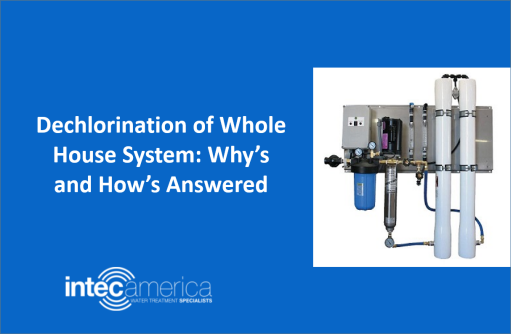Chlorine has been a popular water disinfectant so far. It certainly disinfects the water and terminates bacterial growth. Chlorine has contributed to the prevention of several waterborne diseases over a few decades. However, it purifies the water at expense of a few health hazards. Owing to such health concerns, long-term exposure to chlorine or consumption of chlorinated water is advised to be avoided. Several healthcare and environment protection agencies suggest a reduction of chlorine from the water and whole house water purification systems. That is why point-of-use and whole house water filters are used in chlorine reduction. This post discusses why dechlorination systems are necessary and options are available.

Why Dechlorination of Whole House Water System is Important?
Chlorination of water is adopted as an effective solution for disinfection. Despite its effectiveness in terminating bacterial growth, the Center for Disease Control (CDC) has a limited percentage of chlorine in water up to 4 parts per million (ppm). This is due to several health hazards caused due to consumption of chlorinated water or exposure to chlorinated water. Owing to the following health concerns caused due to chlorinated water, dechlorination of a whole house water system is essential.
- Chlorine Poisoning: Regular consumption of chlorinated water can potentially cause chlorine poisoning. A user may suffer from coughing, throat pain, swollen throat, stomach pain, blood pH imbalance, and blood in stools.
- Cancer: According to a study by the Environmental Protection Agency (EPA), long-term exposure to chlorine and is byproducts such as Trihalomethanes (THMs) can lead to bladder cancer. During digestion, chlorine remains a residue and reacts with good bacteria in the human body. This results in the killing of good bacteria and the formation of disinfection by-products (DBPs). This can result in cancer and mutagenic problems.
- Skin Dryness and Irritation of Eyes: Exposure to chlorinated water during bathing, swimming, etc can dry up the skin. This can irritate the skin cells. It can cause dry patches on the skin. Also, chlorine water can irritate the eyes.
To overcome all these problems, it is important to remove chlorine from whole house systems, such as from drinking and bathing water.
How to Implement a Dechlorination Whole House and/or Point-of Use Water System?
The following solutions can be adopted to remove chlorine from whole house water systems.
- Activated Carbon Filtration (Block / Non-backwashing): Water filters with activated carbon helps in reducing chlorine from water. Carbon is available in many forms, and some are chemically treated and offer multi-use applications. These activated carbon water filters can be installed where water comes into a residence for treatment at every faucet or smaller activated carbon cartridges be used at a sink for treating water for drinking and cooking.
- Whole House Water Filters (Note-please see above): The whole house water filters usually consist of backwash filtration units. Backwash filters often comprise granules of filtration media and can also be used in a mix bed configuration to remove more contaminants. Adding activated carbon granules to the backwash filtration media can effectively remove chlorine from the utility or municipal water source.
- Reverse Osmosis Drinking Water Systems: Reverse osmosis is an effective technique for the removal of dissolved contaminants and chemicals and can be sized for whole house (POE) or point-of-use (POE). The first or second stage usually involves the removal of chemicals (including chlorine) before the water is force-filtered through the semipermeable membrane of the RO system. This multi-step process can remove a wide range of contaminates. Smaller RO drinking water systems are a great choice for filtering drinking water.
- Other Options: There are quite a few other options which are mostly designed for POE applications. This might include distillation, ceramics or gravity filters, EDI, and deionization. All technologies have limitations and it is best to discuss these options with your water treatment professional.
Now that importance of removing chlorine from water and its solutions are discussed, the need for quality filtration equipment should be acknowledged too. That is why you should source water treatment systems like whole house water filters and RO drinking water systems from reliable suppliers like Intec-America. The company offers high-quality products and services for chlorine-free water filtration and purification.


